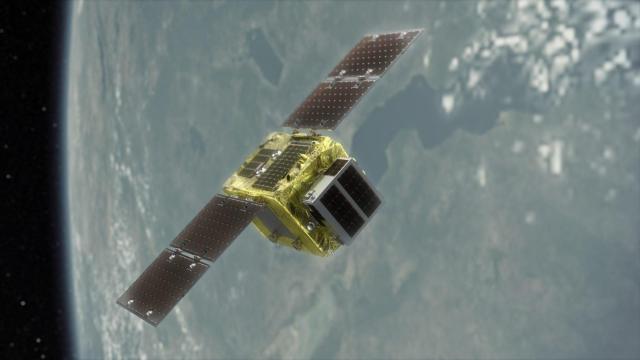The European Space Agency is joining forces with Astroscale, an orbital debris removal company, to thin the massive cloud of space debris orbiting Earth. This effort will pave the way for communications company OneWeb to continue building its telecommunication network.
The European Space Agency revealed in a press release today that Astroscale, a company focusing on space debris removal, will be partnering with OneWeb, a space communications company, on an ESA Partnership Project to develop a spacecraft that will capture satellites in low Earth orbit with a 14.8 million euros ($US15.8 ($22) million) investment from the Agency. The ELSA-M spacecraft developed by Astroscale will be able to remove multiple decommissioned satellites in a single mission, and is set to launch at the end of 2024. The removal of dead satellites from orbit will then pave the way for OneWeb to launch more telecommunications satellites as part of its joint Sunrise Program with the ESA.
“With thousands of satellites already in orbit and thousands more being launched every year, addressing the issue of space debris and finding new ways to remove defunct spacecraft and other types of space junk is of ever-increasing importance — to both reduce the cost of debris damage for satellite operators and ensure space is safe and sustainable,” said UK Science Minister George Freeman in the ESA’s press release.
OneWeb has 428 out of their projected 650 communication satellites orbiting 1,200 kilometers (1,201 km) above Earth, and removing decommissioned satellites will help them complete their constellation, as well as maintain low Earth orbit as a shared resource for other space agencies and companies. Removal of space junk will also help reduce the risk of future collisions and prevent network outages. The ESA and OneWeb have collaborated on space telecommunications as a part of the Sunrise Program before — OneWeb previously developed a “beam hopping satellite” that could respond to changes in communications traffic.
There is a ton of debris in space — NASA says there’s over 27,000 pieces of it in Earth’s orbit — and all that junk threatens the satellites that provide us with music, weather forecasts, and connection to each other. As the space economy grows, maintaining a healthy cleanup effort of defunct, manmade spacecrafts will be vital, and Astroscale is helping to lead the effort.
